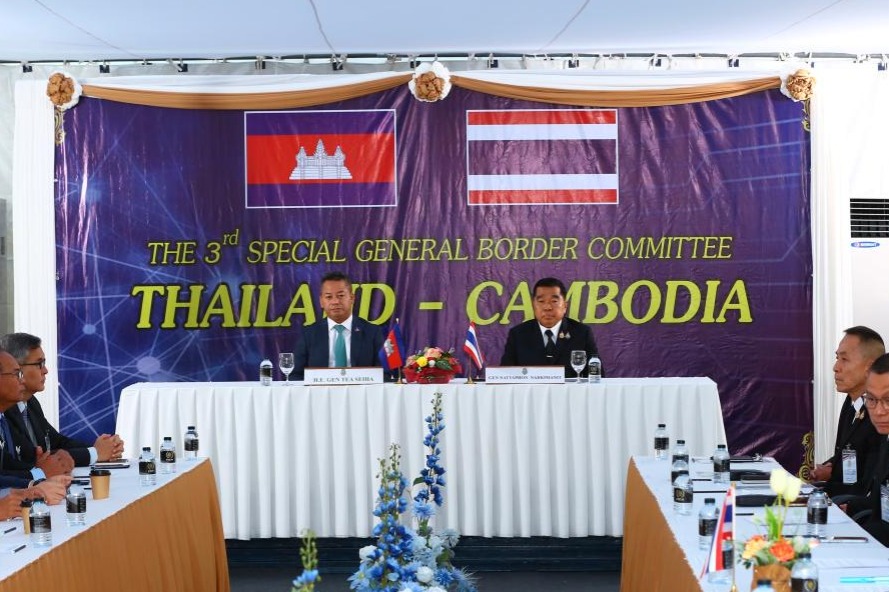Atlantic forum weighs Europe's strategic future

Amid the "America First" policy pursued by the current United States administration and a broader shift from a US-led global order to one marked by escalating great power rivalries, European experts at a London forum underlined that the geopolitical turbulence puts Europe in a tougher position, one in which the continent must seriously consider its strategic autonomy.
The remarks were made last Thursday at the Caixin London Atlantic Dialogue, a forum hosted by the Chinese media group Caixin in the United Kingdom capital.
In the "Expecting Unexpected: How We Navigate an Unfamiliar World" panel, Mark Leonard, co-founder and director of the European Council on Foreign Relations, a pan-European think tank, said the US policy shift represents a "secular trend" and, fundamentally, an ideological reversal, as the US appears no longer aligned with Europe in upholding the consensus around the so-called rules-based international order that has governed the West for the past 80 years.
"What is happening now is that you have an ideological change…where a lot of the rules of the concepts which govern our thinking about the world, the economy, international relations are being upended," he said. "What is particularly difficult for Europeans to get their heads around is that the US is moving from being the upholder of this rules-based order and becoming a normal country, which puts itself first and sees a lot of the things that were previously regarded as assets now as weaknesses."
Pointing to a series of events, such as the announcement of "reciprocal tariffs" and the US-Russia rapprochement, Leonard said these moves have turned the US into a "systemic rival" from the perspective of Europeans.
"It's a systemic rival who may build its entire economic and security models (differently). So, we are going through a period where, on the one hand, people have to negotiate, navigate, and manage as good a relationship with Washington as possible, while rapidly trying to de-risk and diversify," he said.
Philipp Roesler, former vice-chancellor of Germany, said the geographical focus of the US shifting from Europe to the "Indo-Pacific" region is not totally new, but has been accelerated by the current administration. He added that while he agrees the sentiment in transatlantic relations is "truly different", he still believes that the US and Europe share similar values.
Europe has, as a result, entered a period of "revolutionary changes", Leonard noted, and one aspect of this is that countries are moving toward strategic autonomy in their own ways, and that the bloc is actively remaking a unified security framework against the divisions in interests and ideologies.
Roesler described the reform of Germany's debt brake as "the beginning of the changes happening", signaling the country's first recognition of the geopolitical whirlwind.
The debt brake is a constitutional requirement introduced in 2009 that limits the German federal government's annual borrowing to 0.35 percent of its GDP.
Reform of the debt brake could involve loosening fiscal rules to revive the economy, such as by unlocking investment in industry and funding business tax breaks, as well as to find room for additional defense spending.
But "what is not going to happen is that everything gets done by the EU 27", Leonard pointed out. "They are making a difference between unanimity and unity within the EU."
Oil on the flames
In the "Europe: Economic Renewal amid the Quest for Strategic Autonomy" panel, the discussion centered on Europe's economic reform agenda, with experts agreeing that the region must seek to regain its competitiveness amid the great power game, or risk being squeezed by an increasingly competitive, even hostile, environment.
Emre Peker, director of Europe at the risk research and consultancy Eurasia Group, said the challenges facing the EU are long-standing, namely, a sluggish economy, fiscal challenges, an ageing population, declining innovation competitiveness, and other issues, and that US President Donald Trump merely "adds more fuel to the fire" that has been burning in the EU for a long time.
"Trump just makes everything that the EU is already facing a lot more difficult," he said. "We really see this as Europe's do-or-die moment, because either they deliver in line with the ambition they have articulated as a chance to live and fight for another day, as the US and China increasingly widen the gap with Europe on competitiveness, or it fails and becomes an open-air museum."
Peker also considered that the wake-up call came a bit too late. "There is a lot of realism that was absent from the room," he said. "Maybe five years ago, maybe even during Trump's first term, Europe had to counter these threats alone, or at least build the capacity to single-handedly counter these threats."
In the case of the UK, Mark Logan, a former member of UK parliament and former vice-chair of the all-party parliamentary group on China, characterized British political leadership as like those "who only change whenever there is a crisis in front of them" and that the US has, in a twisted way, pushed the UK to reflect on how to really improve as a nation.
Looking ahead, experts all emphasized the importance of a long-term industrial strategy to catch up in the race.
With both the EU and the UK confronting these challenges, Anton Spisak, associate fellow at the Centre for European Reform, suggested that the two neighbors cooperate in a more structured and coordinated manner.

































